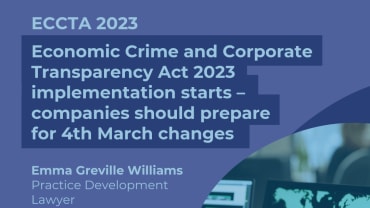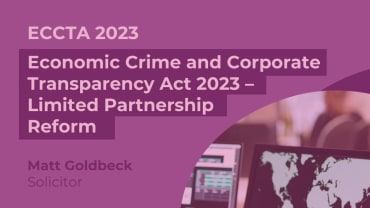Offering shares in a company for sale to the public is a highly regulated activity with significant financial and indeed criminal penalties for those who fail to comply with the law.
Offers of shares to the public
Offering shares in a company for sale to the public is a highly regulated activity with significant financial and indeed criminal penalties for those who fail to comply with the law.
The Financial Services and Markets Act 2000 ("FSMA") is the key piece of legislation in this area and the Financial Services Authority ("FSA") has the responsibility for making and enforcing the rules relating to the documentation required to allow shares to be offered to the public.
To work out what documentation is needed to allow an offer of shares to be made, companies need to consider the following questions.
1. Are the shares being offered to the public?
Under section 85(1) of FSMA, it is unlawful to offer transferable shares to the public in the UK without publishing an approved prospectus save in very limited circumstances.
In the past there was a threshold of 50 people below which shares were not deemed to be offered to the public. Sadly section 102B of FSMA does not give us a clear answer as to what constitutes an offer to the public. If a person is offered shares on terms which enable him to decide to buy or subscribe for those shares then that constitutes an offer to the public. In theory an offer to one person that meets this criterion can be an offer to the public and even a verbal offer containing sufficient information could be caught by the prospectus regime.
It is also worth noting that private limited companies are prohibited from offering shares to the public under the Companies Act 2006. If a company did make such an offer, it would be subject to the same regulations that apply to a public limited company.
2. Are there any exemptions available?
Yes there are, in sections 85 and 86 of FSMA, and market practice has developed so that in practice many offers are structured specifically to fall within those exemptions.
The most important of these exemptions are as follows:-
The offer is made only to qualified investors - there is a detailed definition of qualified investor which requires to be carefully reviewed if this exemption is to be relied on, but in essence it covers professional investors and large organisations
- The offer is made to fewer than 100 people (excluding qualified investors)
- The minimum investment is €50,000 per investor
- The total consideration is less than €100,000
- Total consideration is less than €2,500,000 aggregated over a twelve month period
- The shares are not transferable
3. What is a prospectus?
A prospectus is a detailed document that sets out the terms on which the shares are offered for sale and will include information about the company and its products/services, financial information, and risk factors. A prospectus must be approved by the FSA prior to issue. It is a lengthy document and expensive and time consuming to prepare. This is why so many companies take advantage of the exemptions, especially if they are not raising substantial sums.
The big advantage of having a prospectus is that once approved it can be freely circulated to an unlimited number of people with no restrictions whatsoever.
4. What happens if I don't need a prospectus?
If the company is listing its shares on AIM then the offer document will have to comply with the AIM rules. These contain a list of the information required which mirrors some of that required for a prospectus.
In all other cases then there is no specific list of information that must be included. However section 397 of FSMA makes it an offence to make misleading, false or deceptive statements or dishonestly to conceal material facts with a view to inducing a person to buy or sell shares.
The prudent approach is to include as far as possible the information people expect to find in a prospectus, only omitting information if there is a justifiable reason for doing so.
The offer document produced will be subject to the financial promotion regime. There is a restriction in section 21 of FSMA which requires that any offer document must be approved by an authorised person failing which it can only be sent to people who fall within certain exempt categories.
This leaves the company with two options.
Option 1 - have the document approved. Whilst this has cost implications, it does mean that once approved the document can be widely circulated (assuming the 100 persons prospectus exemption is not to be relied on).
Option 2 - make sure that each of those getting a copy of the offer document falls within an exemption.
What exemptions are available under the financial promotion regime?
There are a wide variety of exemptions available, all with detailed definitions which must be carefully examined if they are to be relied on. In essence they cover:
- Investment professionals
- High net worth individuals
- High net worth companies
- Existing members of the company
Conclusion
When raising money first check if the company is offering shares to be public. If so, will the prospectus regime apply? If an exemption can be found does the offer document have to be approved or can an exemption under the financial promotion regime be found for every person who receives the document?
Mistakes can be costly - fines, up to two years in prison and unlimited financial liability to investors.











